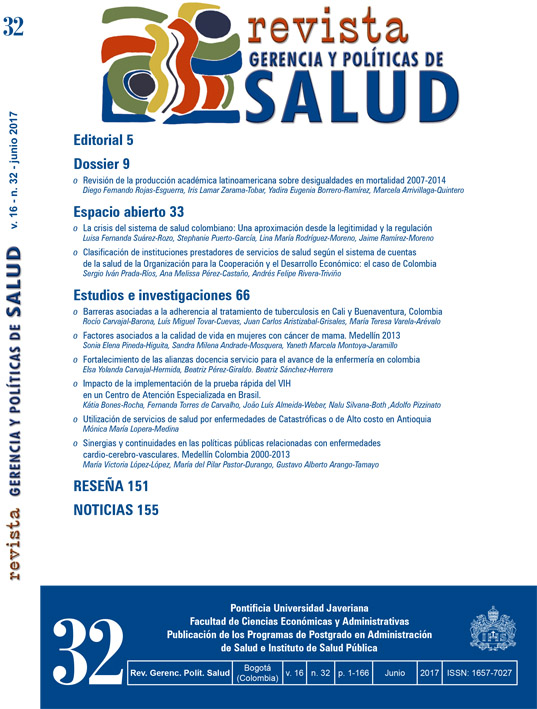Abstract
Introduction: Breast cancer is a public health problem that generates various factors and feelings which affect the quality of life. Objective: to evaluate factors associated with quality of life in breast cancer patients. Methods: Descriptive cross-sectional study involving 82 patients. Quality of life was calculated with WHQOL-BREF and the associated factors were determined using a binary logistic regression model. Results: 73.1% rated quality of life at least as good. The physical sphere was the most affected (65.1 ± 15.9), while the environment was the least affected (78.2 ± 14.2). The variables that explain the deterioration of the quality of life were: age <50 years, diagnosis of advanced cancer upon admission to the benefit plan management (EAPB), while protective variables were satisfaction with the service and hormonal therapy. Conclusion: it becomes necessary to emphasize and to create a better satisfaction with the service in women under fifty and those who were admitted to the program with an advanced diagnosis.
2. Rubinstein A, Terrasa S. Medicina familiar y prác- tica ambulatoria, segunda edición. Buenos Aires: Panamericana; 2006.
3. World Health Organization. Word cancer report. Lyon: WHO; 2003 [acceso: 14 de marzo del 2017]. Disponible en: http://bit.ly/295nrp34. Organización Panamericana de la Salud, Organiza- ción Mundial de la Salud. Cáncer en las Américas. Perfiles de país 2013. Washington: OPS/OMS; 2014.
4. Profamilia. Encuesta Nacional de Demografía y Salud 2010. Colombia: Profamilia; 2010.
5. Boyle P, Ferlay J. Cancer incidence and mortality in Europe 2004. Ann Oncol. 2005;16:481-8.
7. Recalde MT, Samudio M. Calidad de vida en pacientes con cáncer de mama en tratamiento oncológico ambulatorio en el Instituto de Previsión Social en el año 2010. Mem Inst Investig Cienc Salud.
2012;10:13-29.
8. Mehnert A, Koc, U. Psychological comorbidity and health-related quality of life and its association with awareness, utilization, and need for psychosocial support in a cancer register- based sample of long- term breast cancer survivors. Journal of Psychoso- matic Research. 2000; 864(4):383-91.
9. World Heath Organization (WHO). Cancer inci- dence and mortality worlwide in 2008. Disponible en http: www.globocan.iarc.fr.
10. Medina VJJ et al. Calidad de vida de las pacien- tes con cáncer de mama: cirugía radical versus cirugía conservadora. Cirujano General. 2015; 37(1-2):15-24.
11. Badía X, Salamero M, Alonso J. La medida de la salud. Guía de escalas de medición en español, tercera edición. Barcelona: Edimac; 2002; p. 125-9.
12. Díaz S, Piñeros M, Sánchez O. Detección temprana del cáncer de mama: Aspectos críticos para un programa de tamizaje organizado en Colombia. Rev Colomb Cancerol 2005;9(3):93-105.
13. Muñoz D, Contreras L, Balderas A, Hernández A, Chávez Solano P, Mariscal I, Lomelí L, et al. Calidad de vida en mujeres mexicanas con cán- cer de mama en diferentes etapas clínicas y su asociación con características sociodemográficas, estados co-mórbidos y características del proceso de atención en el Instituto Mexicano del Seguro Social. Value in Health. 2011;14(5):S133-S136.
14. Salas C, Grisales H. Calidad de vida y factores aso- ciados en mujeres con cáncer de mama en Antioquia, Colombia. Rev Panam Salud Publica. 2010;28(1).
15. Sebastián J, Manos D, Bueno MJ, Mateos N. Imagen corporal y autoestima en mujeres con cáncer de mama participantes en un programa de intervención psicosocial. Clínica y Salud [Internet]. 2007 Sep. [acceso: 22 de mayo del 2017];18(2):137-161. Dis- ponible en: http://scielo.isciii.es/scielo.php?script=s- ci_arttext&pid=S1130-52742007000200002&lng=es
16. Khan F, Amatya B, Pallan JF, Rajapaksa, I. Factors associated with long-term functional outcomes and psychological sequelae in women after breast cancer. The Breast. 21(3);314-20.
17. Aguilar Cordero M, Neri Sánchez M, Padilla López CA, Pimentel Ramírez ML, García Rillo A, Sánchez López AM. Factores de riesgo como pronóstico de padecer cáncer de mama en un estado de México. Nutr Hosp. 2012;27(5):1631-6.
18. Garduño C, Sánchez-Sosa JJ, Riveros A. Calidad de vida y cáncer de mama: efectos de una intervención cognitivo-conductual. Revista Latinoamericana de Medicina Conductual. 2010;1(8):69-80.
Copyright notice
The Journal Management and Health Policies is registered under the Creative Commons Recognition 4.0 International license. Therefore, this work can be reproduced, distributed and publicly communicated in digital format, provided that the name of the authors and the Pontificia Universidad Javeriana are recognized. It is allowed to quote, adapt, transform, autoarchive, republish and create from the material, for any purpose (including commercial), provided that authorship is properly acknowledged, a link to the original work is provided and if changes have been mad. The Pontificia Universidad Javeriana does not retain the rights over published works and the contents are the exclusive responsibility of the authors, who preserve their moral, intellectual, privacy and publicity rights.
The endorsement of the intervention of the work (revision, style correction, translation, layout) and its subsequent disclosure is granted through a license to use and not through a transfer of rights, which means that the journal and the Pontificia Universidad Javeriana disclaims any liability that may arise from ethical misconduct on the part of the authors. As a result of the protection provided by the license for use, the journal is not obliged to publish retractions or modify the information already published, unless the erratum arises from the process of editorial management. The publication of contents in this magazine does not represent royalties for taxpayers.


